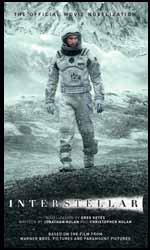|
Click here to return to the main site. Book Review
With its resources depleting, the Earth is suffering a slow painful death, while ex-astronaut, Cooper tries to farm in an environment which is quickly becoming little more than a dust bowl. Inexplicable events lead Cooper to mankind’s last hope for a future, to leave the Earth and find a new home in the depths of space. But in order to gain the stars, how much is Cooper willing to sacrifice? Interstellar (2014. 278 pages), written by Greg Keyes, is the official novelisation of the acclaimed Christopher Nolan film. The book is a good example of the strengths of both types of media, for those who have yet to see the film, the wow factor of the visuals is, for the most part missing, though they are artfully conveyed through the characters reaction to them. By way of compensation, there is an expansion of the characters internal lives, thoughts and feelings, as well as a more detailed explanation of the science behind the trip. The story centres around Cooper and his family, a son and a daughter, eking out a bare existence on an Earth which has suffered an ecological disaster, hinted to be mans own doing through his greed and overuse of resources. While I’m sure there is a warning in the set up the book spends little time in criticising current trends, leaving the reader to make up their own mind. This is just one possible end game scenario for both the human race and the Earth. In 1984 fashion the government continues to promise that the great breakthrough which will lead to the planet's recovery is coming soon, while more species continue to go extinct. Cooper's daughter, Murphy, is convinced that their house has a ghost or at least an entity trying to communicate with them, an idea dismissed by Cooper. However strange occurrences continue which leads Cooper to a hidden NASA establishment and a plan to send a ship through a worm hole to determine if the new plants which have been discovered are suitable for human life. The story contains many elements which had to glossed over in the film and the novelisation is a good chance to put this right and Keyes gives clear and understandable explanations for worm holes, time dilation and black holes. Of course, in both the film and book versions it is not hard to work out who the Deus ex machine and the Ouroboros effect works with the stories internal logic. Amongst the number of things the book does well is to balance the idea of family, which apart from the exploration is what the story is really about, the ties that bind. There is a nice balance between what happens to Murphy, back on Earth and her father Cooper out in the unknown, so that even though different times pass you still feel that the two stories are happening concurrently. Keyes is an established writer, in his own right, having provided the excellent Psi Corp trilogy for the Babylon 5 spin off books. He has written original novels for Star Wars and The Elder Scrolls, which I remember thoroughly enjoying. Interstellar represents his twenty-first published novel. Overall, given the restriction on the writer, this is a good adaptation of the film, certainly up there with Fosters Alien books, so well worth a read even if you’re not going to see the film any time soon. 7 Charles Packer Buy this item online
|
|---|


